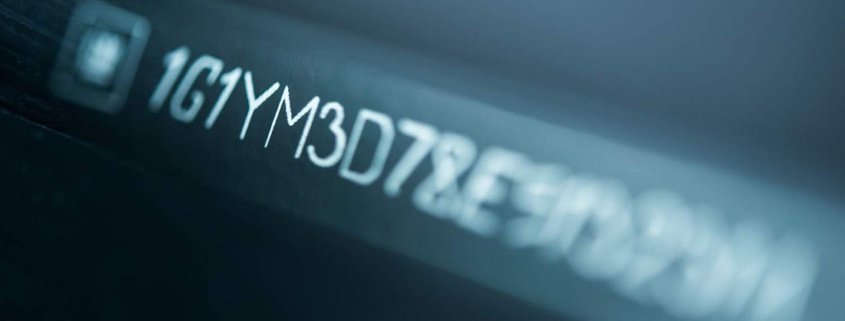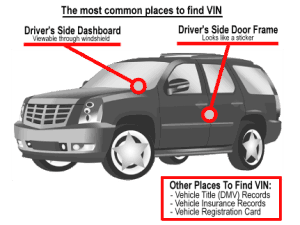How to Read a VIN on a Car (Vehicle Identification Number)
The Ultimate Guide on Vehicle Identification Numbers.
A vehicle identification number (VIN) is the vehicle’s 17-digit name. The vehicle ID number is made up of letters and digits that the automaker allocates to each unique car, each having a distinct significance.
Typically found mounted on the driver-side dashboard by the windshield. You can also find it on the driver-side doorjamb and the engine’s firewall.
Table of Contents
- How to tell the year of the vehicle by the VIN
- What is a Vehicle ID number?
- What is VIN short for?
- How to tell a vehicle’s history by the VIN
- Where to find the VIN on a vehicle
- How to read a vehicle identification number
- How to tell the year of a car by the VIN
- Country of Origin VIN digit
- How to determine the manufacturer by the VIN
- Third through eighth characters
- What does the ninth character of a VIN mean?
- The tenth character of the VIN is the model year
- What does the 11th character describe?
- The last six digits of a vehicle ID number
What is a Vehicle Identification Number (VIN)
A vehicle identification number, VIN for short, is a distinctive serial number used by automotive manufacturers to identify each motor vehicle. Manufacturers first used vehicle identification numbers on motor vehicles in 1954; each manufacturer used their VIN format until 1981, making the system very confusing.
The National Highway Traffic Safety Administration (NHTSA) of the United States standardized the format in 1981 to become the current 17-digit VIN format.
The NHTSA required any on-the-road motor vehicle to be sold must have the standard 17-digit vehicle identification number.
To avoid any confusion:
The standardized NHTSA VIN format does not include the letters O, Q, or I.
What Does VIN Stand For?
VIN is the abbreviation for Vehicle Identification Number. Other terms and jargon of VIN are:
- Vehicle ID Number
- Car ID
- Serial number
- Car VIN
- VIN number (redundant, however incorrect)
Example of a 1998 Honda Accord EX VIN:
1HGCG1659WA029633
How to Tell a Vehicle’s History By the VIN
The vehicle identification number is like a vehicle’s fingerprint, unique to the individual car; it can tell you a lot about the vehicle’s history.
Anything reported about the car through insurance companies, title companies, law enforcement agencies, etc., will be said through the VIN of the vehicle (Similar to your social security number).
Several online vehicle history companies provide car buyers the information they need to find branded title vehicles and lemons by searching for the vehicle’s history using the VIN.
Protect yourself by doing two things:
1. Obtain a used car history report on the vehicle.
2. Have the vehicle inspected by a certified mechanic.
I strongly advise having a licensed independent technician inspect the car for any technical problems before buying a used car.
It would be best to look over the vehicle’s history report to look for any hidden flaws that might cost you money down the road.
Where to Find a VIN on a Vehicle
Depending on the manufacturer, the VIN can be found on VIN plates, stickers, or stamped all over a vehicle. The most common places you can find a Vehicle ID Number are:
- In front of the driver, where the windshield meets the dash. (Most common location on a vehicle)
- Drivers door jams on the inside edge of the door where it latches to the frame. (Second most common location)
- In the engine compartment on the firewall.
- The vehicle stats plate is located under the hood in the engine compartment.
- On the steering column on some of the older vehicles.
- On the inside of body panels, engine, heads, frame, etc.
- Sometimes the VIN can be found etched on the glass of some cars.
Other places you can find a vehicle’s VIN:
- On the vehicle title (DMV) records.
- Vehicle insurance records.
- Vehicle registration card.
How to Read a Vehicle Identification Number
Each digit of the VIN has a different meaning. Below I’ve broken down each character and given you a brief description of each one.
How to Tell the Year of a Car by the VIN
The most common character used in a VIN, the 10th character from the left, will tell you what year the vehicle is.
Car VIN# 1HGCG1659WA029633
Look at the 10th digit of the VIN – W = 1998
| Year of a Vehicle by the VIN | ||||
|---|---|---|---|---|
| 1981 = B | 1991 = M | 2001 = 1 | 2011 = B | 2021 = M |
| 1982 = C | 1992 = N | 2002 = 2 | 2012 = C | 2022 = N |
| 1983 = D | 1993 = P | 2003 = 3 | 2013 = D | 2023 = P |
| 1984 = E | 1994 = R | 2004 = 4 | 2014 = E | 2024 = R |
| 1985 = F | 1995 = S | 2005 = 5 | 2015 = F | 2025 = S |
| 1986 = G | 1996 = T | 2006 = 6 | 2016 = G | 2026 = T |
| 1987 = H | 1997 = V | 2007 = 7 | 2017 = H | 2027 = V |
| 1988 = J | 1998 = W | 2008 = 8 | 2018 = J | 2028 = W |
| 1989 = K | 1999 = X | 2009 = 9 | 2019 = K | 2029 = X |
| 1990 = L | 2000 = Y | 2010 = A | 2020 = L | 2030 = Y |
*Vehicle VIN code for the year manufactured past 2027 not yet confirmed
How to Tell the Country of Origin By the VIN
The first character of a VIN will tell you the Country of origin who made the vehicle.
Car VIN# 1HGCG1659WA029633
Look at the first digit in the VIN 1 = United States
Here are a few of the most common Country of origin VIN Codes:
| Country of Origin VIN codes | ||
|---|---|---|
| United States | = | 1 |
| Canada | = | 2 |
| Mexico | = | 3 |
| United States | = | 4 & 5 |
| Australia | = | 6 |
| Brazil | = | 9 |
| Japan | = | J |
| Korea | = | K |
| France | = | F |
| Germany | = | W |
| Sweden | = | Y |
How to Determine the Manufacturer By the VIN
You can tell the manufacturer of a vehicle by looking at the second digit of the VIN.
Car VIN# 1HHGCG1659WA029633
Look at the second character of the VIN H = Honda
Some VIN characters may stand for several different manufacturers.
Here is a list of some of the most common and discontinued manufacturers. Manufacturers do change; however, this list should be accurate and up-to-date.
| Manufacturer by the VIN | ||||||||
|---|---|---|---|---|---|---|---|---|
| Mitsubishi | = | A | Acura | = | H | Toyota | = | T |
| Range Rover | = | A | Honda | = | H | Volkswagen | = | V |
| Jaguar | = | A | Jeep | = | J | Volvo | = | V |
| Audi | = | A | Lincoln | = | L | Yugo | = | X |
| Dodge | = | B | Daewoo | = | L | Mazda | = | Y |
| Chrysler | = | C | Hyundai | = | M | Mercury | = | Z |
| Delorean | = | C | Mini | = | M | Hummer | = | 3 |
| Mercedes Benz | = | D | Nissan | = | N | American General | = | 3 |
| Eagle | = | E | Infiniti | = | N | Geo | = | C, G, 8 |
| Ford | = | F | Kia | = | N | |||
| Chevrolet | = | G | Porsche | = | P | |||
| Cadillac | = | G | Plymouth | = | P | |||
| Oldsmobile | = | G | Isuzu | = | S | |||
| Saturn | = | G | Saab | = | S | |||
| Buick | = | G | Suzuki | = | S | |||
| GMC | = | G | Lexus | = | T | |||
Third Through Eighth Characters of a Vehicle ID Number
The manufacturer uses the third through eighth numbers of a VIN, which might signify various things.
Car VIN# 1HGCG1659WA029633
Examine the VIN’s third through eighth digits: GCG165 = Manufacturer Specifics
- G = Passenger car built-in US/Canada.
- CGI = Honda Accord 4 Door V6 VTEC.
- 6 = 4 door sedan automatic.
- 5 = Special (The eighth digit always describes the engine on domestic vehicles.)
These VIN digits can also describe some or more of the following:
- Vehicle type – Passenger car, multi-purpose vehicle, etc.
- Restraint system – Front or side airbags etc.
- Transmission – Automatic or Manual
- Car Line and Series – Accord, Civic, Malibu, Fiesta, etc.
- Body type – 4 doors, two doors, Convertible, etc.
What Does the Ninth Character of a VIN Mean?
The ninth number of a Vehicle Identification Number is called the check digit. It is the critical number to use when validating the VIN.
Car VIN# 1HGCG1659WA029633
Look at the ninth digit of the VIN 9 = Check Digit
The Tenth Character of the VIN is the Model Year of the Vehicle
The tenth number of a Vehicle ID Number describes the manufactured year. It is the most commonly referenced number in a VIN.
Car VIN# 1HGCG1659WA029633
Look at the tenth character of the VIN W = 1998
To check the year of a vehicle by the vehicle identification number, view my vehicle ID by year chart.
What does the 11th character describe?
The eleventh digit of a Vehicle ID Number describes the final plant the vehicle is assembled.
Car VIN# 1HGCG1659WA029633
Look at the eleventh character of the VIN A =?
Each manufacturer has its plant codes; final plant assembly frequently changes with manufacturers. Although the manufacturers can change their codes, their eleventh digit location in the VIN is standardized. With this in mind, I cannot provide a current list of these codes.
The Last Six Digits of a Vehicle ID Number
The last six digits in a Vehicle Identification Number are the actual serial numbers of that specific vehicle.
Car VIN# 1HGCG1659WA029633
Look at the last six characters of the VIN 029633 = Serial Number
- The last six numbers of a Vehicle Identification Number are always the vehicle’s serial number and vehicle specific.
- The first ten characters may be the same. However, the last six digits will be different on every vehicle.
- The ninth digit or Check Digit may also be different on the vehicle.










